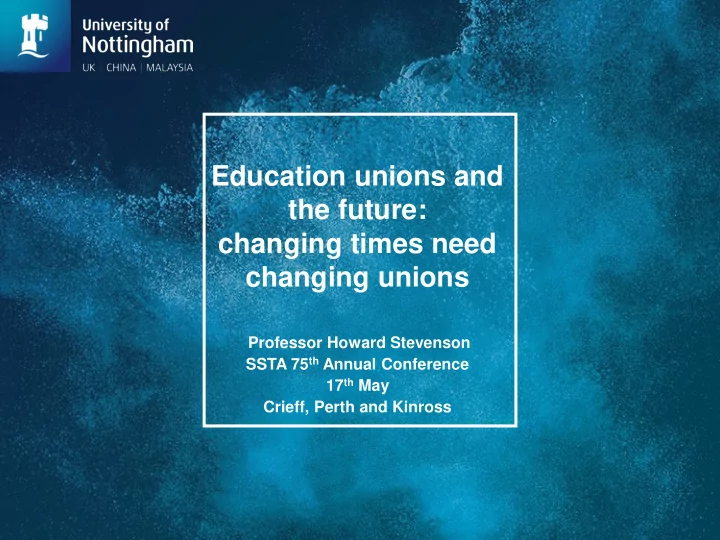

Education unions and the future: changing times need changing unions Professor Howard Stevenson SSTA 75 th Annual Conference 17 th May Crieff, Perth and Kinross
The research • Chile (Colegio de profesores) • Kenya (KNUT) • New Zealand (NZEI and PPTA) • Scotland (EIS) • Poland (ZNP) • Turkey (Egitim-Sen) • USA (NEA and AFT)
Teacher union challenges • Work intensification – Working longer and harder • De-professionalisation – Loss of control/professional judgement • Closing down of public and democratic spaces – Attacks on collective bargaining, trade unions rights, growth of managerialism • Privatisation – Fragmentation, competition • Wider societal challenges – ( Teachers don’t join a union instinctively in the way my generation did – General Secretary).
Teacher union challenges • Teachers don’t join a union instinctively in the way my generation did – General Secretary – decline of traditional institutions – political parties, trade unions, organised religion – population diversity – growth of populism/hate politics – importance of social media – the rise of ‘social movement politics’/single issue campaigns
The case for union renewal Resource gap Pressures on teachers Union resources
The warning signs of decline • Decreasing membership • Decreasing member participation in union democracy – meeting attendance, union elections • Decreasing member participation in union events and actions • Shrinking and ageing activist base
The importance of social dialogue – alignment and connection European Semester Supra-national (example) Central National Vertical ‘alignment’ government Local authority Regional/local Institutional Workplace ‘Industrial’ ‘Professional’ Horizontal ‘connection’
Three dimensions of organising • Organise at the workplace: build at the base • Organise everyone: create inclusive cultures • Organise around ideas: campaign and educate
Organise at the workplace: build member engagement I regularly attend local association meetings I currently am a school union representative I have participated in union-provided CPD I share union-related content on social media I follow the union on social media I have attended at least one local association meeting I know who my local association secretary is I contribute to decision making through my union The union is essential to me achieving my professional goals I feel included when the union develops policies The union gives support to make me a more effective and successful teacher The union has an influence on workload management in my school I keep up-to-date with union issues The union makes me feel like I can make a difference The union assists me in getting the working conditions I need to be able to do my job properly The union has an influence on my work conditions I know who to speak to if I have a problem that the union can help with The union makes a difference for me The union advocates for adequate teaching and learning resources to carry out my job The union gives me the opportunity to raise issues of professional concern to me I vote in union elections I consider union issues when I vote in local/national elections The union helps me keep up to date with education issues Union policy is relevant to me I am interested in the work that the union does The union exists for teachers like me
Member engagement and connection: what makes the difference? I regularly attend local association meetings I currently am a school union representative I have participated in union-provided CPD I share union-related content on social media I follow the union on social media I have attended at least one local association meeting I know who my local association secretary is I contribute to decision making through my union The union is essential to me achieving my professional goals I feel included when the union develops policies The union gives support to make me a more effective and successful teacher The union has an influence on workload management in my school I keep up-to-date with union issues The union makes me feel like I can make a difference The union assists me in getting the working conditions I need to be able to do my job properly The union has an influence on my work conditions I know who to speak to if I have a problem that the union can help with The union makes a difference for me The union advocates for adequate teaching and learning resources to carry out my job The union gives me the opportunity to raise issues of professional concern to me I vote in union elections I consider union issues when I vote in local/national elections The union helps me keep up to date with education issues Union policy is relevant to me I am interested in the work that the union does The union exists for teachers like me
Organise everyone: connect the workforce • Survey statement: ‘ The union exists fo r teachers like me’ • Interview comment: ‘The union does not look like me’ ‘Branch meeting format is antiquated. Very difficult for new younger members to break into. Same people all the time. Branch meetings go on for way too long!!!!’
Changing unions in changing times Prioritise young/new Focus on priorities teacher activity - workload - self-organising - member-driven - project promotion (campaigns) - national networks (eg - relevance equalities) Union presence in schools - a rep in every school - joint approaches (eg co- reps) Develop networked Develop activism/ists leadership ‘the human touch’ - - connect people - flatter structures - support and develop - reduce bureaucracy and people hierarchy - share roles - share facilities - share knowledge
Recommend
More recommend